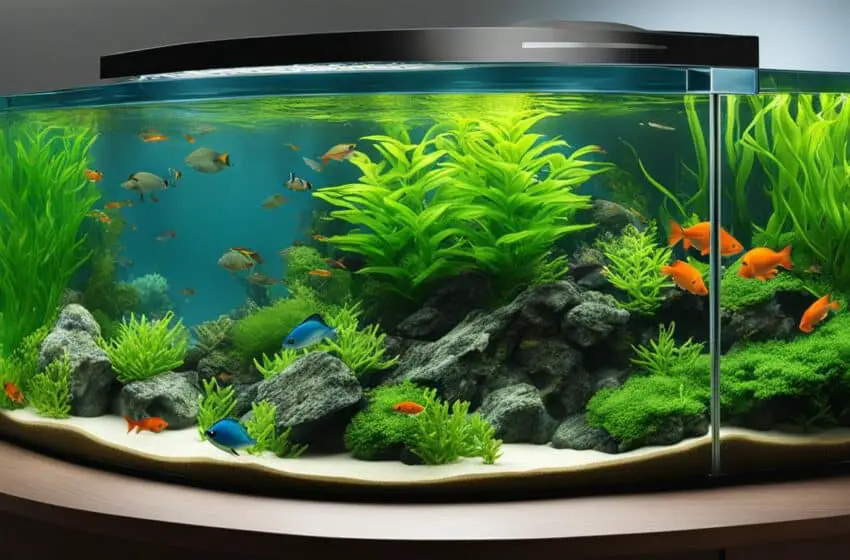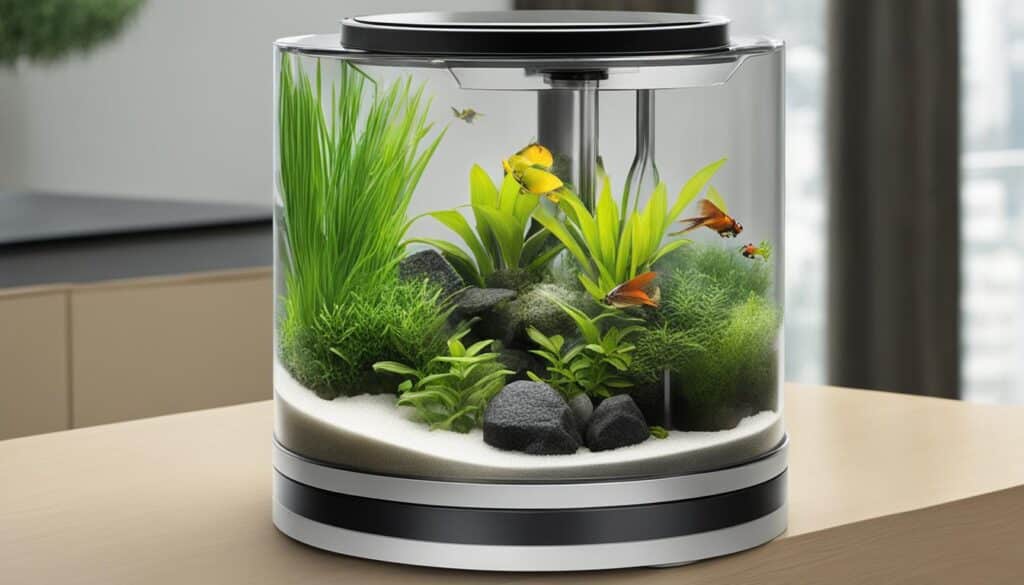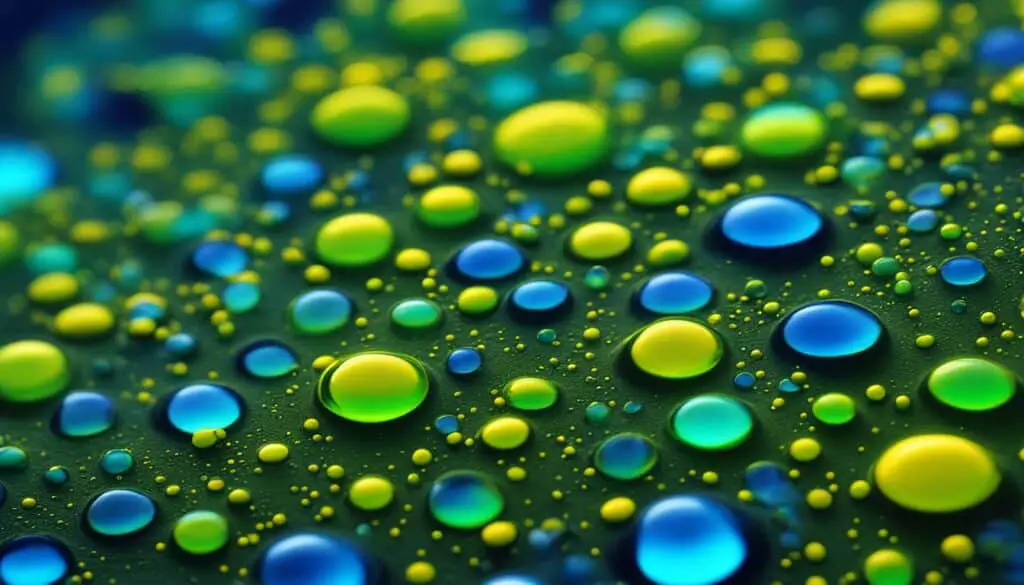Biological Filtration: The Powerhouse of Efficiency

Welcome to the world of energy-efficient marine aquarium filtration systems, where sustainability meets the thriving aquatic environment. In this article, I will delve into the fascinating concept of biological filtration and its significance in creating a healthy and optimal marine aquarium ecosystem.
When it comes to maintaining a sustainable aquatic environment, biological filtration plays a critical role. It is the powerhouse of efficiency, effectively removing toxins and ensuring stable water conditions for the well-being of the aquatic organisms in your marine aquarium.
With a growing focus on sustainability and efficiency, energy-efficient marine aquarium filtration systems have revolutionized the way we approach filtration. These innovative systems strive to minimize energy consumption while maximizing filtration effectiveness, ensuring a harmonious balance between ecological responsibility and optimal aquarium health.
By harnessing the power of biological filtration, aquarists now have the opportunity to create thriving aquatic ecosystems that not only provide a visually stunning display but also contribute to the sustainable preservation of marine life. Let’s explore the wonders of biological filtration and its transformative impact on marine aquariums.
Key Takeaways:
- Biological filtration is essential for maintaining a healthy and sustainable aquatic environment in marine aquariums.
- Energy-efficient marine aquarium filtration systems prioritize sustainability and efficiency.
- These systems effectively remove toxins and maintain stable water conditions.
- By promoting efficient biofiltration, these systems contribute to the well-being of aquatic organisms.
- Advancements in filtration technology allow aquarists to create thriving and eco-friendly aquatic ecosystems.
The Importance of pH Stabilization in Aquariums
Proper pH levels play a crucial role in maintaining a healthy and thriving aquarium environment. Fluctuations in pH can have a detrimental impact on the well-being of aquatic organisms, causing stress and even death. Understanding the factors that affect pH and implementing effective stabilization methods are essential for the longevity of your aquarium ecosystem.
There are several factors that can influence the pH level of your aquarium water. During the initial setup, the discharge of carbon dioxide (CO2) from tap water or substrate materials can cause a drop in pH. Additionally, photosynthesis in waterweed aquariums and increased microbial activity in tanks with a large number of fish can lead to pH fluctuations.
To maintain a stable pH level, the Power House concept offers a range of products designed to address pH imbalances in aquariums. Power House provides two types of products: the Hard Type for controlling pH drops and the Soft Type for controlling pH rises. These products can be used individually or in combination to effectively stabilize the pH level of your aquarium water, ensuring efficient biofiltration over extended periods.
By stabilizing the pH level, you create an environment in which the biological filtration system can function optimally. This allows beneficial bacteria to thrive and effectively process waste, resulting in better water quality and healthier aquatic life.
“Maintaining a stable pH level in your aquarium is crucial for the overall health and well-being of your aquatic organisms. The Power House products provide an effective solution for controlling pH imbalances, ensuring a thriving aquarium ecosystem.”
Investing in pH stabilization is an important step in creating and maintaining a successful aquarium. By utilizing the Power House concept and its range of pH control products, you can ensure a stable and optimal pH level, promoting the long-term health and vitality of your aquatic pets.
Innovative Magnetic Technology in Filtration Systems
AquaClear Power Filters have revolutionized filtration systems with their innovative magnetic technology. The inclusion of a magnetic impeller in these filters has multiple benefits that enhance performance and efficiency.
The magnetic impeller is designed to reduce heat, friction, and wear within the filter system. This results in a longer product lifespan and consistent performance over time. By reducing energy consumption, AquaClear Power Filters prioritize sustainability without compromising performance.
One of the standout features of AquaClear Power Filters is their comprehensive filtration system. These filters provide three forms of filtration: mechanical, chemical, and biological. This ensures optimal water quality by removing debris, pollutants, and harmful substances from the aquarium.
Another notable feature is the flow control mechanism. This allows users to adjust the water flow according to their specific aquarium requirements. Whether it’s a low-flow setup for delicate aquatic species or a high-flow environment for active fish, AquaClear Power Filters offer customization options to meet diverse needs.
Furthermore, AquaClear Power Filters employ a patented refiltration system. This unique design maximizes filtration performance by allowing water to undergo multiple passes through the filtration media, ensuring thorough purification.
AquaClear’s commitment to efficiency is further reflected in the design of their filters. The efficient design ensures the full utilization of the filter container, maximizing filtration capacity. Additionally, AquaClear Power Filters offer easy customization of filter media, allowing aquarists to tailor the filtration system to their specific requirements.
“AquaClear Power Filters, with their innovative use of magnetic technology and comprehensive filtration system, are a game-changer in the industry. The magnetic impeller not only enhances performance but also promotes sustainability by reducing energy consumption. With flow control and a patented refiltration system, AquaClear provides aquarists with versatile and efficient filtration options.”

Comparison of AquaClear Power Filters with Traditional Filters
| Aspect | AquaClear Power Filters | Traditional Filters |
|---|---|---|
| Efficiency | Comprehensive three-stage filtration system | May only offer one or two forms of filtration |
| Customization | Allows easy customization of filter media | Limited options for customization |
| Energy Consumption | Magnetic impeller reduces energy consumption | May have higher energy consumption |
| Design | Efficient utilization of filter container | May have limited filter capacity |
The Ammonia Oxidizing Capability of Filter Media
When choosing a filtration system for your marine aquarium, it is crucial to consider the ammonia oxidizing capability of the filter media. Ammonia is a toxic compound that can be harmful to aquatic organisms if not effectively removed from the water. Filter media plays a vital role in facilitating the process of ammonia oxidation, converting ammonia into less harmful substances.
Various tests have been conducted to determine the efficiency of different filter media in terms of ammonia oxidation. These tests evaluate the surface area and chemical composition of the media, as well as their ability to provide a conducive environment for beneficial bacteria to thrive.
Comparing Filter Media Efficiency
One commonly used filter media is foam, which has been found to be the best static media for ammonia oxidation. Foam provides a large surface area for the attachment and growth of nitrifying bacteria, which are responsible for converting ammonia into nitrite and nitrate. The structure of foam also allows for effective mechanical filtration, trapping debris and preventing clogging in the filter.
Foam filter media offers a high surface area, enabling efficient ammonia oxidation and maintaining water clarity in your marine aquarium.
On the other hand, ceramic rings are less efficient in terms of ammonia oxidation. While they do provide some surface area for bacterial colonization, the porous nature of ceramic rings limits the growth of nitrifying bacteria. As a result, the conversion of ammonia is not as effective compared to foam media.
The Role of Surface Area
The surface area of the filter media plays a significant role in the filtration efficiency of your marine aquarium. A larger surface area provides more space for beneficial bacteria to colonize, enhancing the ammonia oxidation process. By selecting filter media with a substantial surface area, you can effectively maintain water clarity and ensure a healthy aquatic environment.
A suitable filter media with a high surface area will maximize the biological filtration efficiency in your marine aquarium, reducing the concentration of ammonia and promoting the overall well-being of your aquatic organisms.
| Filter Media | Ammonia Oxidation Efficiency | Surface Area |
|---|---|---|
| Foam | High | Large |
| Ceramic Rings | Low | Limited |
Table: Ammonia Oxidation Efficiency and Surface Area Comparison of Filter Media

Conclusion
Energy-efficient filtration systems are revolutionizing the way we maintain sustainable and healthy aquatic environments in marine aquariums. By combining effective biological filtration with innovative features, such as pH stabilization, magnetic technology, and customizable filter media, these systems are optimizing water quality and supporting the well-being of aquatic organisms.
With advancements in filtration technology, aquarists now have the tools to create thriving and eco-friendly aquatic ecosystems. Energy-efficient filtration systems not only promote efficient biofiltration but also contribute to the overall sustainability of marine aquariums. By reducing energy consumption and minimizing waste, these systems align with the growing global concern for environmental conservation and responsible resource management.
By investing in energy-efficient marine aquarium filtration systems, aquarists can ensure optimal water quality while reducing their ecological footprint. These systems not only provide a healthier and more stable aquatic environment but also offer long-term cost savings. The combination of energy efficiency, sustainability, and optimal water quality makes these filtration systems an ideal choice for any marine aquarium enthusiast.
FAQ
What is biological filtration and why is it important in marine aquariums?
Biological filtration is the process of using beneficial bacteria to break down toxins in the water, creating a healthy and sustainable aquatic environment. It is essential for removing harmful substances and maintaining stable water conditions for the well-being of the aquatic organisms.
How do energy-efficient marine aquarium filtration systems contribute to sustainability?
Energy-efficient filtration systems are designed to minimize energy consumption without compromising performance. By using less electricity, these systems help reduce the environmental impact and promote sustainability in marine aquariums.
How does pH stabilization play a role in maintaining a stable aquatic environment?
Fluctuations in pH levels can be detrimental to the health of aquatic organisms. pH stabilization products, like the ones offered by Power House, can effectively control pH drops or rises and ensure consistent water conditions for efficient biofiltration over long periods.
What are the innovative features of AquaClear Power Filters?
AquaClear Power Filters utilize magnetic technology to reduce heat, friction, and wear. This innovative feature results in longer product life, consistent performance, and lower energy consumption. These filters also provide mechanical, chemical, and biological filtration, as well as customizable water flow and patented refiltration system for optimal water quality.
Which filter media is most efficient in terms of ammonia oxidation?
Foam has been found to be the best static media for ammonia oxidation, while ceramic rings are less efficient. The surface area of filter media also plays a significant role in maintaining water clarity and ensuring a healthy aquatic environment.



